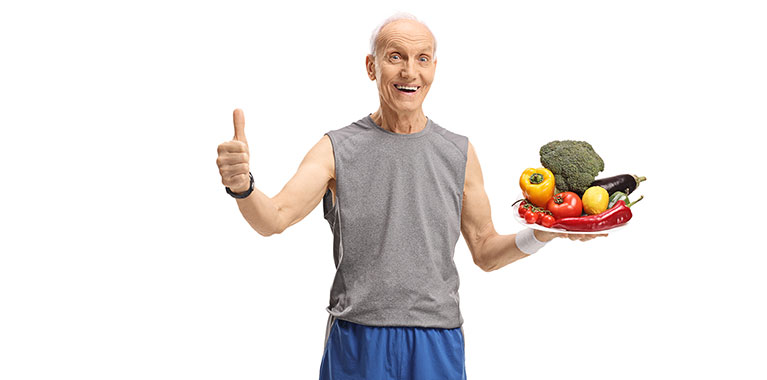5 Key Ways Your Diet Should Change as You Age
I want to thank Tricia Silverman, a registered dietitian and certified wellness coach for her recent workshop called “Active Aging Nutritional Insights” which I attended virtually. Here is a link to her website if you would like to learn more: https://www.triciasilverman.com/
The workshop reminded me that as we age our nutritional needs change and we need to change our eating habits. Below are the 5 key ways your diet should change as you age:
- You are probably not eating enough lean protein:
You should be eating 1-1.2 g per kg of bodyweight of lean protein daily. For example, if you weigh 150 lbs= 68 kg. Your daily protein intake should be between 68-81 g of protein per day. Food log for the next week looking at the protein in your food and track it. - You may be drinking too much alcohol:
Canadian guidelines are:- 10 drinks/week for women, with no more than 2 drinks/day most days (1 drink if you are 65 or older)
- 15 drinks/week for men, with no more than 3 drinks/day most days (2 drinks if you are 65 or older)
- Eating these foods positively affects your Telomeres (cellular biomarkers of aging)
- Folate: green leafy vegetables, beans, Brussels sprouts asparagus
- Niacin: chicken, turkey, salmon, light tuna, brown rice, peanuts
- Vitamin A/Beta Carotene: sweet potato, spinach, pumpkin,
- Vitamin D: sunshine, egg yolk, salmon, rainbow trout, vitamin-D fortified foods
- Vitamin C: citrus, strawberries, red pepper, broccoli, kiwi, Brussels sprouts
- Vitamin E: hazelnuts, sunflower seeds, almonds, peanuts, spinach
- Only eat until you are 80% full
Japanese communities who live well the longest use this concept called Hara hachi bu which means you stop eating when you feel 80% full giving your body the chance to get the message from your brain that you have had enough food. - Your skin will look better if you eat these foods:
- Vitamin C rich foods
- Vitamin E rich foods
- Fish and Omega-3 fats
- Beta Carotene Rich Foods
Vintage Fitness has launched a 4-week nutritional coaching program which complements our personal training program. Book a call to learn more and change your eating and stick with the changes in the long term:
Book a call to for free consultation
Good Luck!
Erin
Vintage Fitness
Vintage Fitness is an in-home personal training company in Toronto, Canada. We specialize in energizing the lives of people over 50 with exercise.
Search
Categories
- Abdominal / Waist Exercises
- Aches and Pains
- Aging Well
- Arm Exercises
- Arthritis
- Back exercises
- Balance for Seniors
- Core
- Diabetes
- Elastic Band Exercises
- Exercise Programs
- Fitness Goals
- Flexibility Exercises
- Guest blog
- Hands
- Heart Health
- Incontinence Exercises
- Knees
- Leg Exercises
- Mental Health
- Neck Exercises
- Nutrition
- Osteoporosis
- Other
- Personal Training
- Posture
- Sciatica
- Shoulder
- Strength Exercises
- Stretching Exercises
- Success Stories
- Virtual Training
- Webinar
- Weight Loss
- Women’s Health






